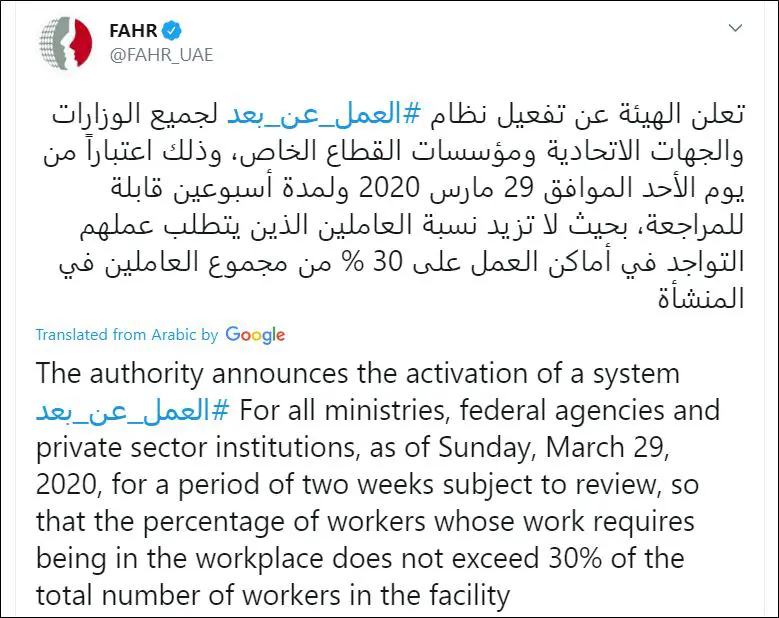As communities are put into quarantine and to a certain extent services from various industries are closed, governments as well as the public sector all over the world are seriously considering to transition certain roles and jobs to work from home set-ups.
Also Read: IN PHOTOS: Workers Sterilize the Streets of Dubai
The UAE is no exemption to this trend as the Ministry of Human Resources and Emiratisation (MoHRE) as well as the Federal Authority For Government Human Resources (FAHR) have decided to activate the ‘Remote Work System‘ for those whose jobs don’t entail physical presence in the office.

UAE to Implement Remote Work System: Maximum of 30% of Private and Public Sector Workforce Allowed to be Physically Present in Offices
According to the report of the UAE’s state news agency, WAM, the Ministry of Human Resources and Emiratisation, MoHRE, has decided that a maximum of 30 percent of the workforce of private entities is allowed to be physically present in the office while others whose jobs don’t necessitate their physical presence will be working remotely starting this Sunday, March 29.
As part of the preventive measure taken to stop the spread of coronavirus, HE Nasser bin Thani Al Hamli, Minister of #MOHRE, issued a new decree on regulating remote work in the private sector. The decree will be operational from 29 March and for 2 weeks extendable. pic.twitter.com/jE8h8CIz2g
— MOHRE_UAE وزارة الموارد البشرية والتوطين (@MOHRE_UAE) March 26, 2020
30% of Seating Capacity for Private Sector Services
In line with this, MoHRE emphasized that private entities should consider minimizing the number of customers visiting their service centers to 30 percent of these centers’ seating capacity and to strictly observe health and safety precautions, such as keeping enough distance between customers, as well as disinfection of devices and utilities.
The measure came in a resolution issued by Nasser bin Thani Al Hamli, Minister of Human Resources and Emiratisation, on regulating remote work at UAE-based private entities as part of the precautionary measures taken to contain the spread of the coronavirus, COVID-19, in coordination with the National Emergency Crisis and Disaster Management Authority (NCEMA).
Exemptions of 30% Rule
However, it is worth noting that the decision exempts several activities which include:
- infrastructure projects,
- catering,
- telecommunications,
- power,
- health,
- education,
- banking,
- food processing,
- health supplies manufacturing and cleaning firms.
Public Sector to Have 30% Employees Maximum in Offices
In a similar move by the Federal Authority For Government Human Resources (FAHR), all ministries, authorities, and federal institutions, effective Sunday, March 29th, will operate via the Remote Work System for a renewable period of two weeks.
Below is the Tweet from FAHR regarding this announcement:
تعلن الهيئة عن تفعيل نظام #العمل_عن_بعد لجميع الوزارات والجهات الاتحادية ومؤسسات القطاع الخاص، وذلك اعتباراً من يوم الأحد الموافق 29 مارس 2020 ولمدة أسبوعين قابلة للمراجعة، بحيث لا تزيد نسبة العاملين الذين يتطلب عملهم التواجد في أماكن العمل على 30 % من مجموع العاملين في المنشأة pic.twitter.com/wq6R5sZ7iY
— FAHR (@FAHR_UAE) March 26, 2020
Below is the translation:

Based on the decision, which will be subject to revision and reassessment, a maximum of 30 percent of the workforce of each entity concerned is allowed to be physically present in the office while others whose jobs don’t necessitate their physical presence will be working remotely.
Sectors Exempted from 30% Rule in Public Sector
The FAHR’s announcement noted several exemptions in those working in vital sectors such as:
- energy,
- telecommunications,
- health,
- education,
- security,
- police,
- military,
- postal services,
- cargo,
- pharmaceuticals,
- water,
- food,
- civil aviation,
- airports,
- identity & citizenship,
- finance & banking,
- government media, and
- services, which include filling service stations, and
- construction projects in addition to any other sectors to be exempted by the government of the UAE for public interest.
In line with this, FAHR calls upon all sectors to utilize smart technology while practicing the remote work system in addition to providing all possible electronic channels and platforms to ensure efficiency.
All sectors are also required to identify standard timeframes and mechanisms for every task assigned to each employee and identify the management system of remote work in terms of work hours, be it a standard or flexible work schedule per day, week, or month.
It is also worth noting that the new Remote Work System should apply to all employees and workers whose jobs don’t entail their physical presence at workplaces, with priority to be given to pregnant women, employees aged 60 and above, people of determination, employees with respiratory and chronic diseases and mothers of children in G-9 and below subject to the approval of their HR Departments.
These are just some of the initiatives adopted by the UAE government and businesses to take care of their economic activities and needs amid the crisis brought about by the coronavirus pandemic.
ALSO READ: 14-Day Mandatory Home Quarantine for ALL Travellers, Punishment for Violators